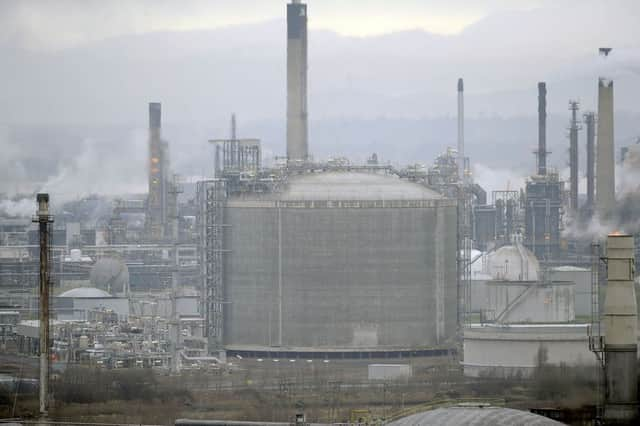Judge urged to dismiss Ineos case to overturn fracking '˜ban'


Advocate James Mure QC told judge Lord Pentland today (Tuesday) that he should dismiss a case brought to Edinburgh’s Court of Session by petrochemical companies Ineos and Reach CSG.
The firms believe the Scottish Government have acted unlawfully in relation to their policy on fracking, a form of energy generation.
Advertisement
Hide AdAdvertisement
Hide AdFracking is a process in which liquid is injected under ground at high pressure in a bid to force open existing fissures and allow engineers to access oil and gas.
The companies believe the government has converted a moratorium on the gas extraction limited into an unlimited ban.
The court heard the company believes a statement made to the Scottish Parliament in October last year was a statement that the government’s policy had changed.
Ineos, which runs an industrial complex in Grangemouth, is seeking a judicial review of the government’s actions.
Advertisement
Hide AdAdvertisement
Hide AdIt says that ministers at Holyrood have made “very serious” errors in their decision making process.
But on Tuesday, Mr Mure, who is acting for the government, argued that the action should be dismissed.
Mr Mure said the companies were mistaken to think that a ban was in place and that ministers were still considering whether fracking should be stopped.
The silk said that ministers were scheduled to make up their minds on the issue in October this year.
Advertisement
Hide AdAdvertisement
Hide AdHe added: “The concept of an effective ban is a gloss. It is the language of a press statement. What they have done is to announce a preferred position on the issue.
“They have not yet adopted a position. Any position which the government will take has to undergo an environmental and strategic assessment.
“The court should therefore allow the policy making process to go to finalisation which is expected in October this year.
“The court should refuse the petitioner’s position.”
Ineos owns two fracking licences in Scotland and imports fracked shale gas from the United States to process at its refinery in Grangemouth.
Advertisement
Hide AdAdvertisement
Hide AdIt has said that a ban on fracked oil and gas extraction would result in Scotland missing out on economic benefits, including about 3100 jobs and £1 billion for local communities.
Ineos also claims that millions of pounds it invested in acquiring fracking licences and obtaining planning permission for drilling sites had been “rendered worthless”.
Legal papers lodged at the Court of Session by the pursuers argue that an October 2017 statement made by the Scottish Government about fracking indicated a policy change.
The pursuers argue that the statement showed that the government had changed its policy from a moratorium to an outright ban.
Advertisement
Hide AdAdvertisement
Hide AdThe pursuers want the court to declare that the Scottish Government acted unlawfully by making this statement.
The pursuers want the court to declare that it is unlawful for Scottish Ministers to use their powers under planning legislation to ban fracking in Scotland.
The petrochemical companies are also seeking damages - the exact sum isn’t mentioned in papers.
On Tuesday, Mr Mure also told the court that the companies were wrong to think that having licences for fracking gave them a special status.
Advertisement
Hide AdAdvertisement
Hide AdHe added: “The licence holders don’t have a particular privilege.”
Mr Mure also told the court that four days has been allocated to the judicial review. He said that lawyers in the case were confident that legal submissions could be completed in three days.
One of the parties involved in the case is the environmental charity Friends of the Earth Scotland. It submitted a public interest intervention in the case last month.
Lawyers for Friends of the Earth will argue that a fracking “ban” is lawful and necessary to meet Scotland’s commitments to stop climate change.
Advertisement
Hide AdAdvertisement
Hide AdThe charity believes that it is the first time that a public interest intervention has been granted in the Court of Session on environmental grounds.
Speaking during a break in proceedings, the charity’s director Dr Richard Dixon said: “This is the first time that an environmental intervention has been considered in a judicial review in Scotland.
“We thought that it was very important to do that because our major concern about fracking is about the impact that it has on the environment.
“It would be very, very, very hard for us to meet our climate change targets in Scotland if we allowed fracking to go ahead.”
The hearing continues.